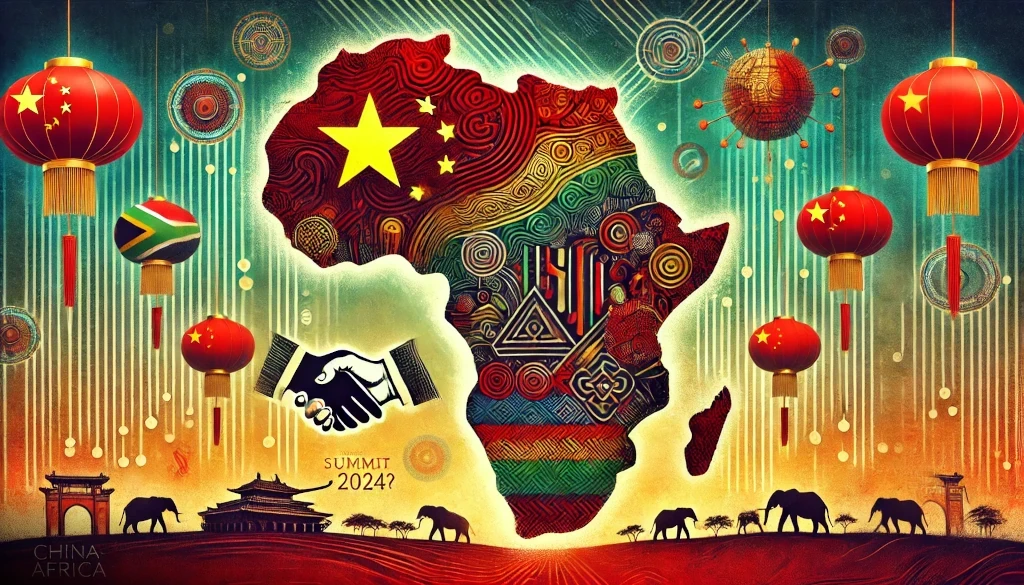Every African knows the adage: “Give a man a fish, and he will eat for a day; teach him to fish, and he will eat for a lifetime.” It is therefore troubling to see so many Africans, across 54 nations, rejoicing at China’s promise to invest $50 billion across the continent without taking the time to understand the economic expertise and complex financial strategies that enable China to manage such sums as if they were pocket change.
From a political economy perspective, China’s approach of uniting African nations into a monolithic bloc is not new. It reflects neocolonial patterns where external powers exploit African resources while offering mere crumbs in return. Yet, many African states willingly accept this new form of soft imperialism, prioritizing short-term gains over long-term autonomy. This precarious exchange could lead to a loss of sovereignty through infrastructure development, perpetuating a cycle of dependence reminiscent of the continent’s colonial past.
In reality, China’s strategy is a calculated geopolitical maneuver on the global trade chessboard. The $50 billion promise is not purely altruistic but a Trojan horse designed to circumvent tariffs imposed by the United States and Europe. By embedding itself in African economies, China is building a geopolitical bulwark, exploiting Africa’s untapped resources and markets to consolidate its global economic dominance.
Bad Faith
The slogan of the China-Africa pact, “Made in Africa by China For the World,” is a slap in the face to Africans—a distasteful joke. China’s actions in Zimbabwe, particularly in exploiting the country’s vast lithium reserves, illustrate profound bad faith in political economy. Although Zimbabwe is a major supplier of spodumene, a key mineral for lithium-ion batteries, China has yet to establish local factories for battery production or electric cars. This lack of industrial investment speaks volumes. Instead of fostering a complete value chain within Zimbabwe’s economy, China continues to extract raw materials, trapping African nations in the low-value segment of global trade, following a well-known neocolonial pattern.
China frequently boasts about its infrastructure investments across Africa, presenting them as development drivers. However, these projects are rarely designed to truly empower local economies sustainably. While Chinese investments in railways, roads, and ports are highly visible, they are often executed by Chinese firms and workers, sidelining local expertise and capacity-building opportunities. The long-term economic impact is thus limited, with African nations remaining dependent on external actors for their infrastructure needs. Genuine economic development would require these projects to be designed, executed, and maintained locally, ensuring that the benefits are reinvested directly into national economies.
More deeply, China’s reluctance to support significant institutional development in Africa reveals a calculated indifference. Beijing understands that sustainable economic growth relies on robust local governance and a well-structured banking system to facilitate large-scale credit issuance—tools that have propelled its own economic miracle. Yet, China offers minimal assistance in helping African governments strengthen their monetary policies or banking systems, crucial for issuing currency without triggering hyperinflation. These mechanisms are key to China’s economic rise, but instead of sharing this knowledge, China leaves African economies vulnerable, perpetuating cycles of underdevelopment while reaping the rewards of their weakness.
Continental Tontine
Africans have long mastered the concept of communal saving—whether called tontine, money pool, or savings squad, the principle remains unchanged. A group of individuals regularly contributes to a collective fund, and each, in turn, withdraws the total amount accumulated, enabling significant personal or communal investments. This mechanism is grounded in deep financial solidarity, where collective effort strengthens individual autonomy while reinforcing social fabric.
Despite seemingly generous promises—$20 billion from China, a similar amount from the EU, and $6 billion from the U.S.—the impact diminishes when spread across Africa’s 54 nations. These figures, though substantial on paper, symbolize a fragmented approach to foreign aid that perpetuates inequality rather than addressing it. Dispersing aid across so many countries without a coherent, unified strategy reduces these contributions to a form of global charity that does little to dismantle structural barriers to development. This aid is like resources drifting into a vast ocean, barely making a ripple where waves of change are desperately needed.
In contrast, a collective aid fund or Continental Tontine offers a fairer and more effective alternative. By consolidating resources and focusing on one country at a time, this model respects the principle of economic empowerment through targeted investment. It has the potential to lift nations out of cycles of dependency, creating transformative change that could ripple across the continent.
De-Risking
Europeans accuse the Chinese of massively subsidizing strategic sectors to give their companies a decisive competitive edge. Yet, this same economic support scheme is used to weaken African nations, reducing them to pawns on the global chessboard, caught in power dynamics that overwhelm them.
Africans seem content to receive fish rather than learn to fish themselves. Their governments often prefer “ready-made” solutions—imported, pre-packaged responses that ultimately benefit foreign interests at the expense of local development. This dependency model undermines local autonomy and hinders sustainable development.
Africa finds itself trapped between a rock and a hard place, or more precisely, between two rocks. Although African nations possess the potential to modernize their citizens’ ability to initiate trade, engage in entrepreneurship, or foster dialogue, the psychological barriers inherited from colonization—the dominance of tribal identities over national unity—significantly hinder the continent’s economic takeoff and social transformation, making it an easy prey. To escape this deadlock, it is essential to dismantle the walls of customs and traditions that weaken Africa and expose it to exploitation.
Jo M. Sekimonyo
Writer, Theorist, Human Rights Advocate, and Political Economist

